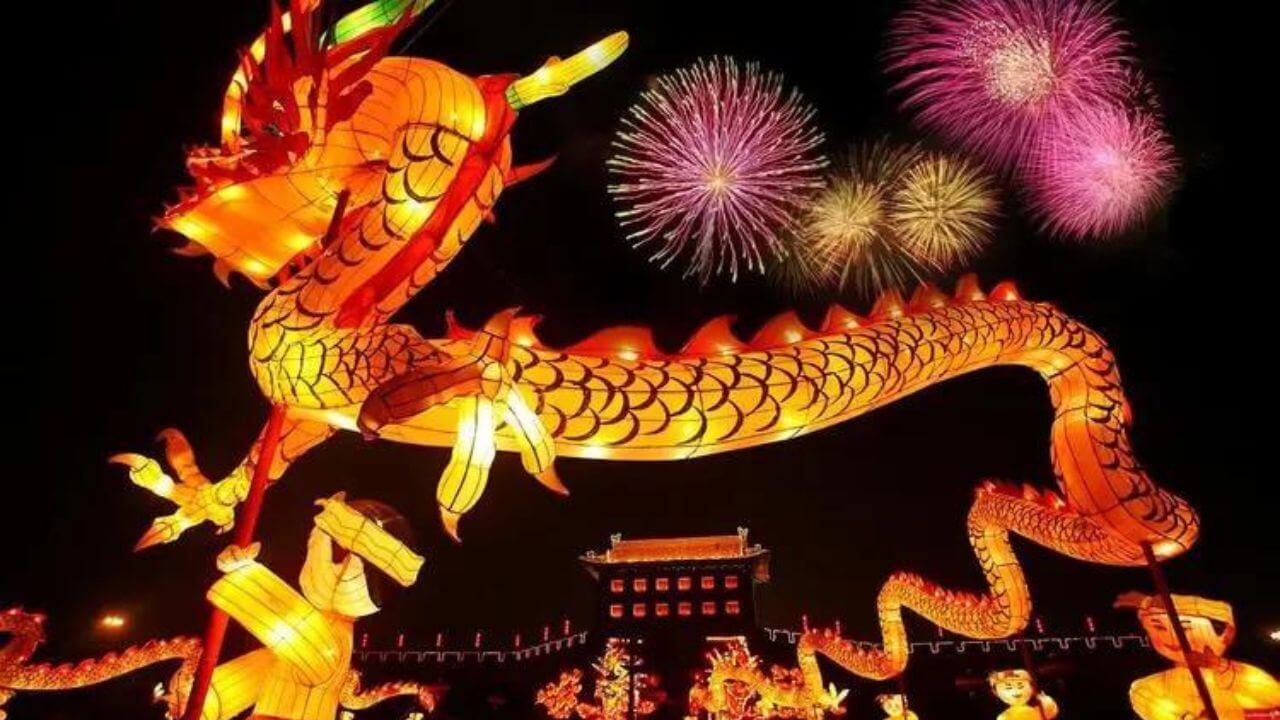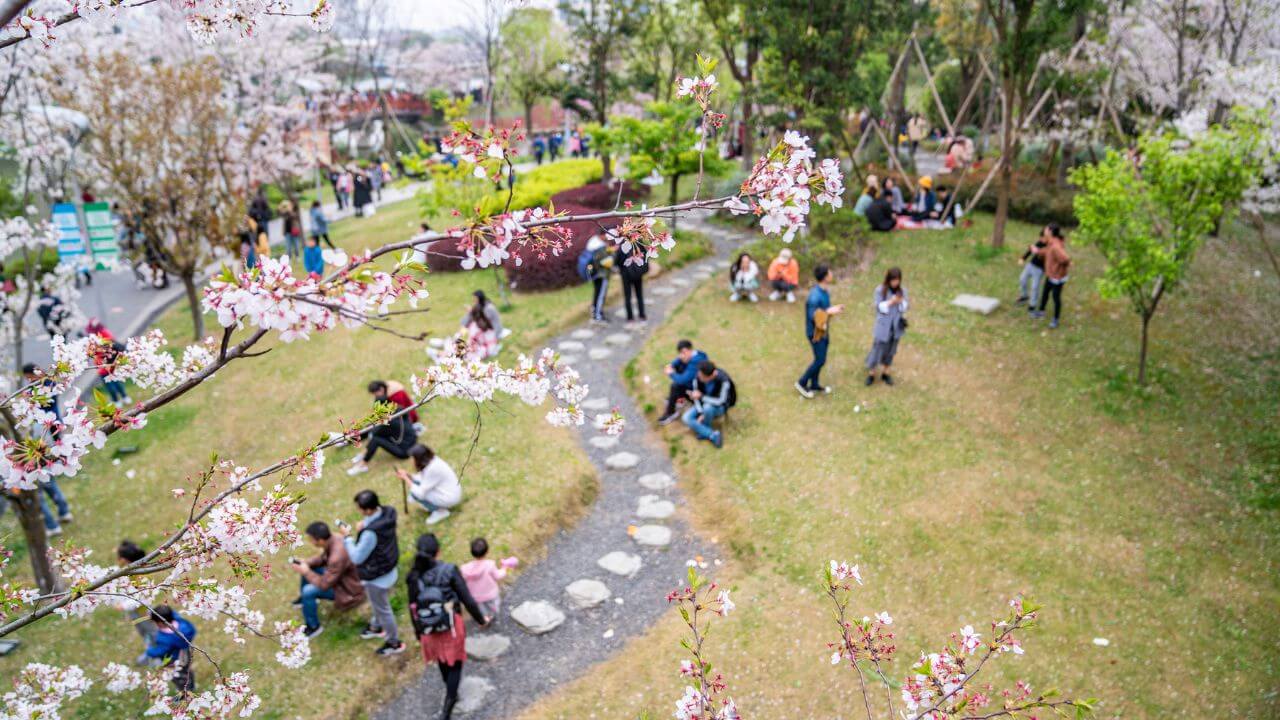China is home to a rich cultural heritage and a plethora of traditional celebrations throughout the year. These festivals often involve elaborate ceremonies, family gatherings, special foods, and colorful decorations. Here are some of the most celebrations in China that you can participate during your trip:

Festivals in China
Chinese New Year (Spring Festival)
- When: Varies (January or February)
- Duration: 15 days
- Overview: The most important and widely celebrated festival in China, marking the beginning of the lunar new year.
- Traditions:
- Family reunions and feasts
- Giving red envelopes (hongbao) with money to children
- Setting off fireworks and firecrackers
- Dragon and lion dances
- Decorating homes with red lanterns and couplets
Lantern Festival
- When: 15th day of the first lunar month (February or March)
- Duration: 1 day
- Overview: Celebrates the end of Chinese New Year festivities, characterized by the display of beautiful lanterns.
- Traditions:
- Lighting and releasing lanterns
- Solving lantern riddles
- Eating yuanxiao (glutinous rice balls)
- Dragon and lion dances

Qingming Festival (Tomb-Sweeping Day)
- When: April 4th or 5th
- Duration: 1 day
- Overview: A day to honor ancestors by visiting their graves, cleaning tombstones, and making offerings.
- Traditions:
- Tomb sweeping and offering food and flowers
- Burning joss paper (symbolic money)
- Flying kites
- Family outings and picnics
Dragon Boat Festival (Duanwu Festival)
- When: 5th day of the 5th lunar month (May or June)
- Duration: 1 day
- Overview: Commemorates the death of the poet and statesman Qu Yuan.
- Traditions:
- Dragon boat races
- Eating zongzi (sticky rice dumplings wrapped in bamboo leaves)
- Drinking realgar wine
- Hanging calamus and wormwood on doors

Mid-Autumn Festival (Moon Festival)
- When: 15th day of the 8th lunar month (September or October)
- Duration: 1 day
- Overview: Celebrates the harvest and the full moon, symbolizing unity and togetherness.
- Traditions:
- Family reunions and moon gazing
- Eating mooncakes
- Displaying lanterns
- Burning incense in honor of the moon goddess, Chang’e
National Day
- When: October 1st
- Duration: 1 week (Golden Week)
- Overview: Commemorates the founding of the People’s Republic of China in 1949.
- Traditions:
- Flag-raising ceremonies
- Parades and fireworks
- Travel and family activities
- Government-organized events and performances

Double Ninth Festival (Chongyang Festival)
- When: 9th day of the 9th lunar month (October)
- Duration: 1 day
- Overview: A day for climbing mountains, appreciating chrysanthemums, and paying respect to elders.
- Traditions:
- Hiking and outdoor activities
- Drinking chrysanthemum wine
- Eating double-nine cake (a layered cake)
- Visiting and caring for the elderly
Winter Solstice (Dongzhi Festival)
- When: December 21st or 22nd
- Duration: 1 day
- Overview: Marks the shortest day and longest night of the year, and celebrates the increase of positive energy with longer daylight hours.
- Traditions:
- Family gatherings and feasts
- Eating tangyuan (glutinous rice balls) in southern China
- Eating dumplings in northern China

Laba Festival
- When: 8th day of the 12th lunar month (January)
- Duration: 1 day
- Overview: A traditional festival marking the enlightenment of the Buddha and the preparation for Chinese New Year.
- Traditions:
- Eating Laba porridge (a sweet porridge made with various grains, nuts, and dried fruits)
- Making offerings to ancestors and deities
- Preparing pickled garlic
These festivals reflect the deep cultural traditions and rich history of China. Participating in or witnessing these celebrations in China offers a unique insight into life and customs, highlighting the importance of family, heritage, and community in Chinese society.

National Holidays in China
China has several national holidays throughout the year, during which government offices, schools, and many businesses close. These holidays are significant cultural and historical events, and they offer the perfect opportunity for travel and celebrations in China. Here are the key national holidays in China:
New Year’s Day
- When: January 1st
- Duration: 1 day
- Overview: Marks the beginning of the Gregorian calendar year. It’s a public holiday where people often enjoy a day off and celebrate with family and friends.
Chinese New Year (Spring Festival)
- When: Varies (between late January and February)
- Duration: 7 days
- Overview: The most important traditional holiday in China, celebrating the lunar new year. It is characterized by family reunions, feasting, giving red envelopes, and various festivities.
- Celebrations: Parades, dragon and lion dances, fireworks, and family gatherings.

Qingming Festival (Tomb-Sweeping Day)
- When: April 4th or 5th
- Duration: 1 day
- Overview: A day to honor and pay respects to ancestors by visiting their graves and cleaning tombstones.
- Activities: Tomb sweeping, offering food and flowers, and family outings.
Labor Day (International Workers’ Day)
- When: May 1st
- Duration: 3 days
- Overview: Celebrates the contributions of workers and laborers. This holiday often includes various public events and family activities.
- Activities: Parades, performances, and travel.


Helen Wang
Travel Advisor & Guide Expert
I started my travel career in 2005 and have since become an expert in Tibet and China’s travel destinations and helping travelers plan unforgettable trips.
For expert travel advice to China or Tibet, feel free to contact me.